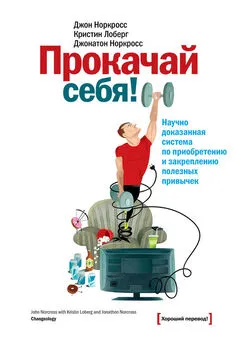Кристин Лоберг - Прокачай себя! Научно доказанная система по приобретению и закреплению полезных привычек
- Название:Прокачай себя! Научно доказанная система по приобретению и закреплению полезных привычек
- Автор:
- Жанр:
- Издательство:Манн Иванов Фербер
- Год:2014
- Город:Москва
- ISBN:978-5-91657-945-1
- Рейтинг:
- Избранное:Добавить в избранное
-
Отзывы:
-
Ваша оценка:
Кристин Лоберг - Прокачай себя! Научно доказанная система по приобретению и закреплению полезных привычек краткое содержание
Хотите ли вы отказаться от вредных привычек или, напротив, приобрести полезные, система будет работать вне зависимости от задачи.
На русском языке публикуется впервые.
Прокачай себя! Научно доказанная система по приобретению и закреплению полезных привычек - читать онлайн бесплатно полную версию (весь текст целиком)
Интервал:
Закладка:
Koocher, G. P., Norcross, J. C., & Greene, B. A. (Eds.) (2013). Psychologists’ desk reference (3rd ed.). New York: Oxford University Press.
Krebs, P., Prochaska, J. O., & Rossi, J. S. (2011). Defining what works in tailoring: a meta-analysis of computer-tailored interventions for cancer-preventive behavior change. Preventive Medicine, 67, 143–154.
Lasser, K., Boyd, J. W., Woolhandler, S., et al. (2000). Smoking and mental illness: a population-based prevalence study. Journal of the American Medical Association, 284 (20), 2606–2610.
Levesque, D. A., Van Marter, D. E., Schneider, R. J., et al. (2011). Randomized trial of a computer-tailored intervention for patients with depression. American Journal of Health Promotion, 26 (2), 77–79.
Levy, D. A. (2009). Tools of critical thinking: metathoughts for psychology (2nd ed.). Long Grove, IL: Waveland Press.
Lilienfeld, S. O. (1998). Pseudoscience in contemporary clinical psychology: what it is and what we can do about it. The Clinical Psychologist, 51 (4), 3–9.
Lilienfeld, S. O., Lynn, S. J., & Lohr, J. M. (Eds.) (2003). Science and pseudo-science in clinical psychology. New York: Guilford.
Marlatt, G. A., & Donovan, D. M. (Eds.) (2007). Relapse prevention: maintenance strategies in the treatment of addictive behaviors (2nd ed.). New York: Guilford.
Marlatt, G. A., & Kaplan, B. E. (1972). Self-initiated attempts to change behavior: a study of New Year’s resolutions. Psychological Reports, 30, 123–131.
McConnaughy, E. A., DiClemente, C. C., Prochaska, J. O., & Velicer, W. E. (1989). Stages of change in psychotherapy: a follow-up report. Psychotherapy, 26, 494–503.
McConnaughy, E. A., Prochaska, J. O., & Velicer, W. E. (1983). Stages of change in psychotherapy: measurement and sample profiles. Psychotherapy, 20, 368–375.
Miller, E., & Marlatt, A. (1997). How to keep up with those New Year’s Resolutions: researchers find commitment is the secret of success. University of Washington study.
Miller, W. R., & Rollnick, S. (2002). (Eds.) Motivational interviewing: preparing people for change (2nd ed.). New York: Guilford.
Miller, W. R., & Tonigan, J. S. (1996). Assessing drinkers’ motivation for change: the Stages of Change Readiness and Treatment Eagerness Scale (SOCRATES). Psychology of Addictive Behaviors, 10 (2), 81–89.
Miller, W. R., Wilbourne, P. L., & Hettema, J. E. (2003). What works? A summary of alcohol treatment outcome research. In R. K. Hester & W. R. Miller (Eds.) Handbook of alcoholism treatment approaches: effective alternatives (3rd ed., pp. 13–63). Boston: Allyn & Bacon.
Mukherjee, Siddhartha. (2010). The emperor of all maladies. New York: Scribner.
Nolen-Hoeksema, S., Wisco, B. E., & Lyubomirsky, S. (2008). Rethinking rumination. Perspectives on Psychological Science, 3, 400–424.
Norcross, J. C. (2000). Here comes the self-help revolution in mental health. Psychotherapy, 37, 370–377.
Norcross, J. C. (2005). The psychotherapist’s own psychotherapy: educating and developing psychologists. American Psychologist, 60, 840–850.
Norcross, J. C. (2006). Integrating self-help into psychotherapy: 16 practical suggestions. Professional Psychology: Research & Practice, 37, 683–693.
Norcross, J. C. (Ed.). (2011). Psychotherapy relationships that work (2nd ed.). New York: Oxford University Press.
Norcross, J. C., & Beutler, L. E. (2011). Integrative psychotherapies. In R. J. Corsini & D. Wedding (Eds.) Current psychotherapies (9th ed.). Belmont, CA: Brooks/Cole Cengage.
Norcross, J. C., Beutler, L. E., & Levant, R. E. (Eds.) (2006). Evidence-based practices in mental health: debate and dialogue on the fundamental questions. Washington, DC: American Psychological Association.
Norcross, J. C., Bike, D. H., & Evans, K. L. (2009). The therapist’s therapist: a replication and extension 20 years later. Psychotherapy, 46, 32–41.
Norcross, J. C., Campbell, L. E., Grohol, J. M., et al. (2013). Self-help that works (4th ed.). New York: Oxford University Press.
Norcross, J. C., & Goldfried, M. R. (Eds.) (2005). Handbook of psychotherapy integration (2nd ed.). New York: Oxford University Press.
Norcross, J. C., & Guy, J. D. (2005). The prevalence and parameters of personal therapy in the United States. In J. D. Geller, J. C. Norcross, & D. E. Orlinsky (Eds.) The psychotherapist’s own psychotherapy. New York: Oxford University Press.
Norcross, J. C., & Guy, J. D. (2007). Leaving it at the office: a guide to psychotherapist self-care. New York: Guilford.
Norcross, J. C., Hedges, M., & Castle, P. H. (2002). Psychologists conducting psychotherapy in 2001: a study of the Division 29 membership. Psychotherapy, 39, 97–102.
Norcross, J. C., Hogan, T. P., & Koocher, G. P. (2008). Clinician’s guide to evidence-based practices: mental health and the addictions. New York: Oxford University Press.
Norcross, J. C., & Karpiak, C. P. (2012). Clinical psychologists in the 2010s: fifty years of the APA Division of Clinical Psychology. Clinical Psychology: Science and Practice, 19 (1), 1–12.
Norcross, J. C., Koocher, G. P., Fala, N. C., & Wexler, H. K. (2010). What doesn’t work? Expert consensus on discredited treatments in the addictions. Journal of Addiction Medicine, 4 (3), 174–180.
Norcross, J. C., Koocher, G. P., & Garofalo, A. (2006). Discredited psychological treatments and tests: a Delphi poll. Professional Psychology: Research & Practice, 37, 515–522.
Norcross, J. C., Krebs, P. M., & Prochaska, J. O. (2011). Stages of change. Journal of Clinical Psychology, 67, 143–154.
Norcross, J. C., Mrykalo, M. S., & Blagys, M. D. (2002). Auld lang syne: Success predictors, change processes, and self-reported outcomes of New Year’s resolvers and nonresolvers. Journal of Clinical Psychology, 58, 397–405.
Norcross, J. C., & Prochaska, J. O. (1984). Where do behavior (and other) therapists take their troubles? II. The Behavior Therapist, 7, 26–27.
Norcross, J. C., Ratzin, A. C., & Payne, D. (1989). Ringing in the New Year: the change processes and reported outcomes of resolutions. Addictive Behaviors, 14, 205–212.
Norcross, J. C., Santrock, J. W., Campbell, L. E., et al. (2003). Authoritative guide to self-help resources in mental health (3rd ed.). New York: Guilford.
Norcross, J. C., & Sayette, M. A. (2012). Insider’s guide to graduate programs in clinical and counseling psychology (2012/13 edition). New York: Guilford.
Norcross, J. C., Strausser, D. J., & Faltus, E. J. (1988). The therapist’s therapist. American Journal of Psychotherapy, 42, 53–66.
Norcross, J. C., VandenBos, G. R., & Freedheim, D. K. (Eds.) (2011). History of psychotherapy: continuity and change (2nd ed.). Washington, DC: American Psychological Association.
Norcross, J. C., & Vangarelli, D. J. (1989). The resolution solution: longitudinal examination of New Year’s change attempts. Journal of Substance Abuse, 1, 127–134.
Norcross, J. C., & Wampold, B. E. (2011). What works for whom: adapting psychotherapy to the person. Journal of Clinical Psychology, 67, 127–132.
Ockene, J., Kristellar, J., Ockene, I., & Goldberg, R. (1992). Smoking cessation and severity of illness. Health Psychology, 11, 119–126.
Ockene, J., Ockene, I., & Kristellar, J. (1988). The coronary artery smoking intervention study. Worcester: National Heart Lung Blood Institute.
O’Neill, S., McBride, C. M., Alford, S. H., & Kaphingst, K. A. (2010). Preferences for genetic and behavioral health information: the impact of risk factors and disease attributions. Annals of Behavioral Medicine, 40, 127–137.
Ouimette, P. C., Finney, J. W., & Moos, R. H. (1997). Twelve-step and cognitive-behavioral treatment for substance abuse: a comparison of treatment effectiveness. Journal of Consulting & Clinical Psychology, 65, 230–240.
Pantalon, M. V., Lubetkin, B. S., & Fishman, S. T. (1995). Use and effectiveness of self-help books in the practice of cognitive and behavioral therapy. Cognitive and Behavioral Practice, 2, 213–222.
Powers, T. A., Koestner, R., & Topcru, R. A. (2005). Implementation intentions, perfectionism, and goal progress: perhaps the road to Hell is paved with good intentions. Personality and Social Psychology Bulletin, 31, 902–912.
Prochaska, J. O. (2004). Population treatment for addictions. Current Directions in Psychological Science, 13, 242–246.
Prochaska, J. O., & DiClemente, C. C. (1985). Common processes of self-change in smoking, weight control, and psychological distress. In S. Shiffman & T. Wills (Eds.), Coping and substance abuse: a conceptual framework (pp. 345–363). New York: Academic Press.
Prochaska, J. O., DiClemente, C. C., & Norcross, J. C. (1992). In search of how people change: applications to addictive behaviors. American Psychologist, 47, 1102–1114.
Prochaska, J. O., DiClemente, C. C., Velicer, W. E, et al. (1985). Predicting change in smoking status for self-changers. Addictive Behaviors, 10, 395–406.
Prochaska, J. O., & Norcross, J. C. (2010). Systems of psychotherapy: a transtheoreticalanalysis (7th ed.). Pacific Grove, CA: Brooks/Cole Cengage.
Prochaska, J. O., Norcross, J. C., & DiClemente, C. C. (1995). Changing for good. New York: Avon.
Prochaska, J. O., Norcross, J. C., & DiClemente, C. C. (2005). Stages of change: prescriptive guidelines. In G. P Koocher, J. C. Norcross, & S. S. Hill (Eds.) Psychologists’ desk reference (2nd ed.). New York: Oxford University Press.
Prochaska, J. O., Norcross, J. C., Fowler, J., et al. (1992). Attendance and outcome in a worksite weight control program: processes and stages of change as process and predictor variables. Addictive Behaviors, 17, 35–45.
Prochaska, J. O., Vehcer, W. R., Fava, J. L., et al. (2001). Counselor and stimulus control enhancements of a stage– matched expert system intervention for smokers in a managed care setting. Preventive Medicine, 32, 23–32.
Prochaska, J. O., Vehcer, W. F., Rossi, J. S., et al. (1994). Stages of change and decisional balance for twelve problem behaviors. Health Psychology, 13, 39–46.
Project MATCH Research Group. (1997). Matching alcoholism treatments to client heterogeneity: Project MATCH posttreatment drinking outcomes. Journal of Studies on Alcohol, 58, 7–29.
Rosen, C. S. (2000). Is the sequencing of change processes by stage consistent across health problems? A meta-analysis. Health Psychology, 19, 593–604.
Rosen, G. M. (1993). Self-help or hype? Comments on psychology’s failure to advance self-care. Professional Psychology Research and Practice, 24, 340–345.
Schwarzer, R., & Leppin, A. (1989). Social support and health: a meta-analysis. Psychology & Health, 31, 1–15.
Scogin, F., Bynum, J., & Calhoun, S. (1990). Efficacy of self-administered treatment programs: meta-analytic review. Professional Psychology. Research and Practice, 21, 42–47.
Seligman, M. E. P. (2007). What you can change and what you can’t. New York: Vintage.
Shiftman, S., Paty, J. A., Gnys, M., et al. (1996). First lapses to smoking: within-subjects analysis of real-time reports. Journal of Consulting and Clinical Psychology, 64, 366–379.
Читать дальшеИнтервал:
Закладка:










